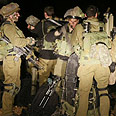
Reservists in action
צילום: AFP
Top officer: Activity efficient for limited amount of time
IDF officials war ground offensive in its present form may lead to mistakes, expose forces to Hamas terrorists. Senior officer clarifies political echelon will have to make decision on military operation's future
As Operation Cast Lead entered its 18th day, Israel Defense Forces officials estimated Monday night that the current stage of the military campaign, in which reserve soldiers are operating alongside regular forces in the Gaza Strip, would only be efficient for a limited amount of time.
The political echelon will next have to make a decision on the military activity's future, the officials added.
A senior officer used a cautious statement, saying that the current move was aimed at "strengthening the achievement and striking the enemy." IDF officials estimate that a much more significant operation is needed in order to expand the military campaign.
"We are ready for any decision," said the senior officer, "and we'll know how to implement it efficiently."
According to the official, the current activity will be efficient for a limited amount of time. The political echelon will then have to decide on whether to halt or worsen the military operation.
The exchanges of fire between IDF soldiers and Hamas gunmen in the Gaza Strip resumed Monday night. Reserve forces are now operating alongside paratroopers, Golani, Givati and armored forces around Gaza City.
The reservists are meant to provide the regular forces with more room for maneuvering which would lead to additional confrontations with terrorists, the uncovering of terror infrastructures and thwarting the rocket fire.
The instructions given to the forces change from one area to another and are not subject to a timetable. The goal is simple: Damaging Hamas' ability to act as much as possible.
Nonetheless, the military sources are lowering their expectations and clarifying that the operation in its present form will lead to dozens more casualties among Hamas at the most. This will mean that the pressure on Hamas will increase, but it won't lead to a breakthrough.
IDF officials fear that the activity in its present form, with so many forces stationed on a limited area, could lead to mistakes as the one which happened Monday evening, when reservists fired at a paratroopers' force. Another risk is that the forces may be more exposed to attacks by Hamas fighters.
"We've thwarted hundreds of terror attacks with a variety of methods, we've uncovered tunnels and explosive devices, but it's clear that there is no 100% in this matter and the risk is always there," a military official said.
All the forces are now under the command of Gaza Division Commander Brigadier-General Eyal Eisenberg. Another division, operated by Southern Command Chief Major-General Yoav Galant, who is the chief commander in charge of Operation Cast Lead, may also enter the operation.
On the ground, the forces seem to be busy fighting rather than engaging in questions on the future of the operation. Lieutenant-Colonel Ronen Dagmi, deputy commander of the 401st Armored Brigade told Amos Harel, the representative of the written press in Gaza, that the discussions on the operation's future are not harming the forces' activity on the front.
Cell phones taken away
"When the army has clear area borders and a clear mission, it knows how to act. This is what is happening in Gaza now," says Lieutenant-Colonel Yehuda Cohen, commander of the Givati Brigade's Rotem Battalion.
Cohen believes that the fighters must deal with the enemy and nothing else. For this purpose, all of the soldiers' cell phones have been taken away from them. The decision to take the cell phones was made in the 2006 Lebanon war and is aimed at preventing field security mishaps. It also separates the troops completely from what is taking place in the home front.
"We are now focusing on the mission," says Cohen. "We haven't even received newspapers here. When we finish what we have been tasked with, we'll express interest in what people up there are saying about it."
Lt.-Col. Cohen has good reasons to want his soldiers to focus on the enemy. In one of the recent days a battalion force encountered three terrorists emerging from a tunnel.
"We responded immediately and caused the tunnel to collapse over them," he says. "No one was injured from the sniper fire. There was also a suicide bomber on a motorcycle, who disappeared into a house's backyard. We encircled the house and hit him from afar."
Cohen has no hesitations in regards to the significant force used, the outcomes of which are seen on the ruined Palestinian homes on the sides of the roads.
"We saw house bombs here, houses booby-trapped from the inside or houses where the gas pipe was left open and all openings were sealed so that they blow up on us as we enter," he explains. "Those who booby-trap houses should not be surprised when we detonate them from afar in order to protect our soldiers' lives."
As he stands on the balcony of a house, Cohen points south. "We saw them launching rockets and mortar shells from inside. When we entered the school itself, we found a weapons storeroom there. We let the civilians leave and made sure that no one hurts them."










